History
The most progressive tribes found in India are the Orans or Oraons. They are mostly the ones who are into education and worship in churches. An Indian Congress leader Kartik Oraon, was the most, educated Oraon and former State Communication Minister of India. Albert Ekka, the Paramveer Chakra awardee (Highest Award for Bravery in India), The Roman Catholic Archbishop of Ranchi, Cardinal Telesphore Placidus Toppo, are Oraon.
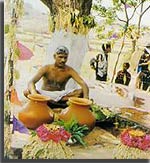
These tribes are mainly found in the states of Jharkhand, Bihar, West Bengal and Odisha. Oraons are the second largest population of tribes in Bihar and Jharkhand. Efficient, particularly in tea garden works, Oraons are believed to have settled in the Chotanagpur Plateau centuries ago.
The President of South Carolina Business Community and a Board Member of Costal Carolina University Oran P Smith, is an Oran of the Oran tribal community. It clearly reflects how far the people of the Ppogressive Tribe have reached, something which sets them apart from other tribes.
Place /Location (then and now) |
Delhi, Patna, Bhopal, Hyderabad, Allahabad and Lucknow, West Bengal |
Languages spoken |
Kurukh, Brahia, Paharia |
Religion/God |
Sarna Darma which is a sacred Groove |
Culture
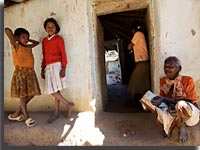
Special hunting ceremony is also celebrated exclusively for women folks in the Oran Society. This tribal community in India is also known world wide as they still believe in following age old custom of human sacrifice. These sacrifices are carried out during the famous Sarhul festival celebrated before cultivation of crops, as a mark of respect to please the local deity. They worship Gods and Goddesses but a great number of these tribes have adopted Christianity. In the ancient days, this community used to follow Sarna religion. Sana Darma is a sacred Groove. Rest of them are the followers of the Christian Religion. However both schools of thought live under the same roof called the Orans.
A remarkable feature of Oraon society is that it is one of the very few on earths (along with the neighboring Mundas and Marias) that practices human sacrifice (called otanga or orka by Oraons). Police records show that even as late as the 1980s there were a couple of sacrifices among the Munda, Maria, and Oraon tribes, and perhaps slightly more if one assumes that not all cases reached the police attention. These sacrifices are of course illegal and are treated as homicide under Section 302 of the Indian Penal Code.
Occupation
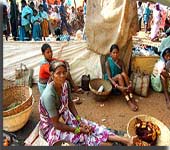
Majority of the population of Oraons can be found in Northeastern states engaged in the occupation of tea cultivation.
Now Orans have taken to various professions - these include tea estate managment in Assam, West Bengal and Nepal.
Language
Orans speak the language called Kurukh which belongs to the Dravidian Family and is related to the Pahari language (language of mountains). It has a special recognition as it is taught in Ranchi University. Majority of the Oraon tribes are Hindus and are religious minded people. They also use other languages like Brahui and Paharia.
People
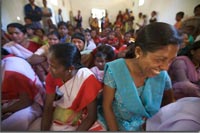
The Oraon have their traditional community council at the village level headed by a Mahto. They have a regional council known as the Parha composed of a number of villages.
Festivals
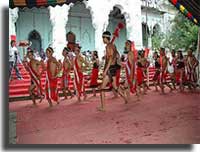
A main deity is taken as Dharmes, and they also believe in a host of spirits. A priest is invited to perform their life cycle rituals. An Ojiha or mati is specially called to cure diseases by appeasing evil spirits. Both men and women participate in dance, which are performed at social events and festivals.


